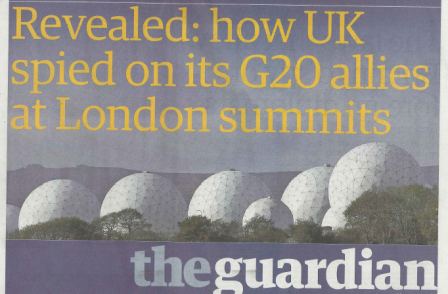
Detailed revelations about how British security services spied on foreign powers when the UK hosted a G20 summit in 2009 were splashed across the first five pages of The Guardian on Monday.
The story was timed for maximum impact, coming as it did on the first day of the G8 summit in Northern Ireland. The revelations were sensational: including claims that GCHQ had hacked into delegates’ Blackberries and tricked them into using fake internet cafes to monitor their emails.
But it has prompted little follow-up in the UK media – certainly nothing like the amount of coverage given to the Sunday People's revelation that Charles Saatchi had grabbed his wife Nigella Lawson by the throat outside a London restaurant.
The FT and The Times did not mention it in their coverage of the G8 Summit on Tuesday and the Telegraph published only a short focusing on the furious reaction from Turkey and South Africa to the spying claims. Only The Independent followed up the substantive allegations in addition to covering the reaction from foreign powers.
The BBC has also chosen to largely ignore the story.
The Guardian suggested in a story published on Monday night that a “confidential D Notice” had been had been used as an “attempt to censor coverage of surveillance tactics employed by intelligence agencies in the UK and US”.
This story quoted from a Defence Advisory Notice sent to editors and journalists on 7 June, in the wake of the first Guardian revelations from NSA whistleblower Edward Snowden (but before Monday’s story). Such notes are seen by hundreds of journalists, so are hardly state secrets, but this one was given a wider airing by the Guido Fawkes blog.
It said:
Private and Confidential: Not for publication, broadcast or use on social media.
Defence Advisory Notice
There have been a number of articles recently in connection with some of the ways in which the UK Intelligence Services obtain information from foreign sources.
Although none of these recent articles has contravened any of the guidelines contained within the Defence Advisory Notice System, the intelligence services are concerned that further developments of this same theme may begin to jeopardize both national security and possibly UK personnel…
My understanding is that Monday’s Guardian coverage is seen as being in breach of DA Notice 5.
This requests that editors seek advice from the DA Notice Committee secretary before publishing details of:
“specific covert operations, sources and methods of the Security Service, SIS and GCHQ, Defence Intelligence Units, Special Forces and those involved with them, the application of those methods, including the interception of communications, and their targets; the same applies to those engaged on counter-terrorist operations”
But this doesn’t explain the lack of follow-up. The DA-Notice system makes clear that it does not seek to stop journalists from publishing information which is already in the public domain.
So while the DA Notice committee's secretariat may have been unhappy about the Guardian’s initial publication, it won’t have sought to stop other news organisations repeating the allegations.
It may be that the lack of follow is partly down to the fact that only The Guardian has access to the leaked documents – from whistleblower Edward Snowden. It is a difficult story to cover without directly referencing a competitor, something which news organisations are reluctant to to.
But it seems a stronger reason may be a reluctance by editors to undermine the perceived UK national security interest.
This is certainly the case put by the Daily Mail, which used a full-page column yesterday to condemn the Guardian coverage.
Stephen Glover wrote: “Whatever The Guardian, with its head in the clouds, may believe, the British government has an obligation to protect this country’s strategic and economic interests in a world in which foreign governments are ruthlessly pursuing theirs.”
He added: “How interesting that the paper which got so worked up by the News of the World’s obviously indefensible hacking of mobile phones of private individuals, most of them celebrities, should so carelessly reveal the important secrets of the British government…
“Don’t imagine the paper is being naïve: it is far too sophisticated for that. Treachery is too strong a word, but it is impossible to find any decent motive for what The Guardian as done.”
There is no censure for The Guardian now it has broken the rules of the DA-Notice club. As I understand it, the system is purely voluntary and aims to provide editors with background information on a confidential basis so they can make informed decisions on whether or not to publish information which could, perhaps unwittingly, undermine security and even put lives at risk.
I've asked The Guardian for some more insight into how they weighed the public interest before publishing Monday's story. But in the meantime perhaps it is worth pondering the fact that with two thirds of Guardian online readers now abroad, notions of serving the UK national interest may become more complicated.
Email pged@pressgazette.co.uk to point out mistakes, provide story tips or send in a letter for publication on our "Letters Page" blog
